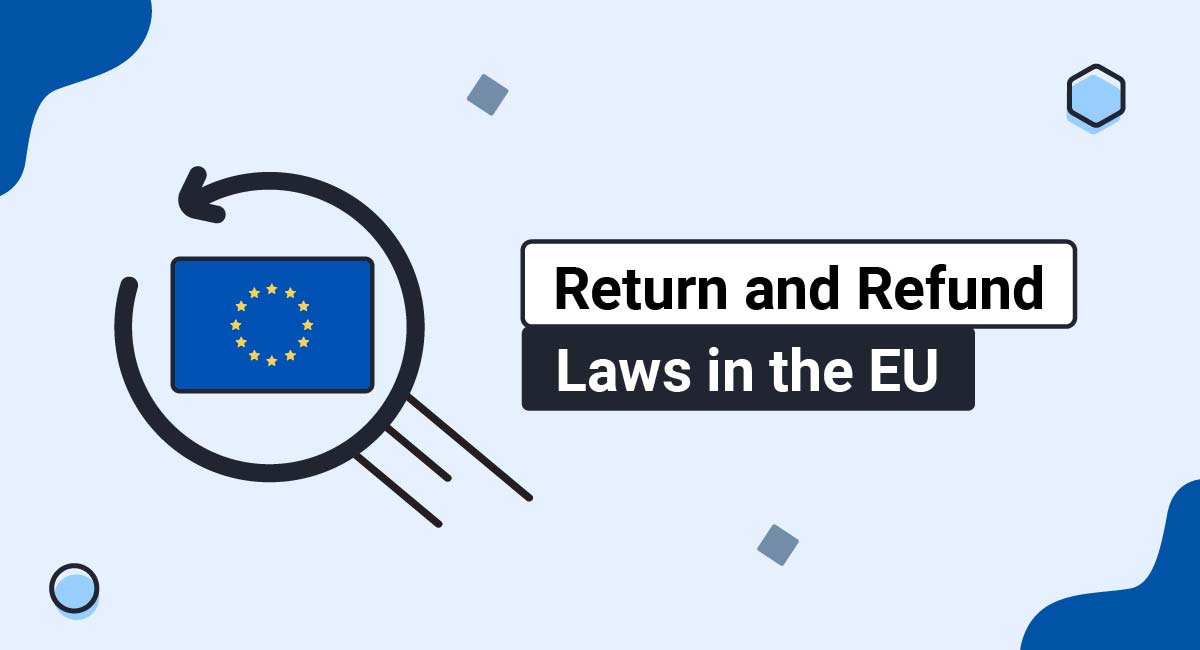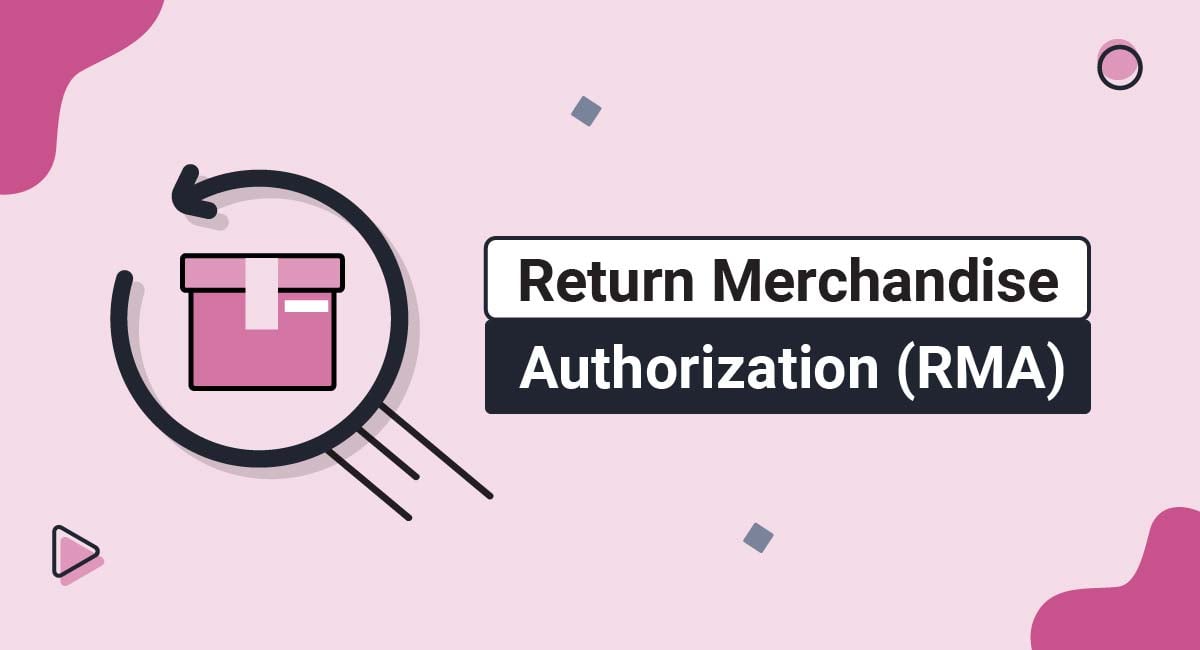If you sell goods or services within the European Union (EU), then you may need to offer returns or refunds in certain circumstances. This is because the EU imposes various obligations on sellers to protect consumers and improve their confidence when shopping online.
Below, we explore the main EU return and refund laws and how they affect business owners. We will also explain the steps you should take to ensure compliance with the applicable laws.
Use our Return & Refund Policy Generator to generate a Return and Refund Policy for your store. Just follow these steps:
-
At Step 1, select where your Return & Refund Policy will be used.
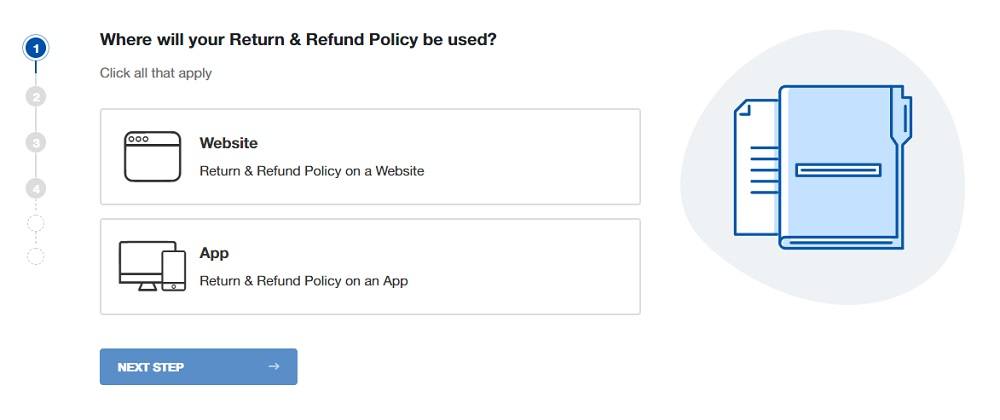
-
At Step 2, add information about your website/app and business.
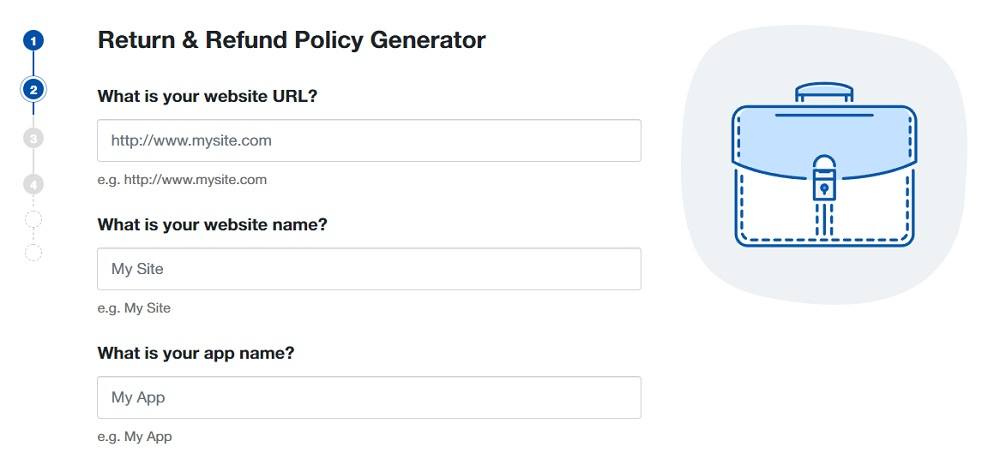
-
Answer some questions about your business practices.
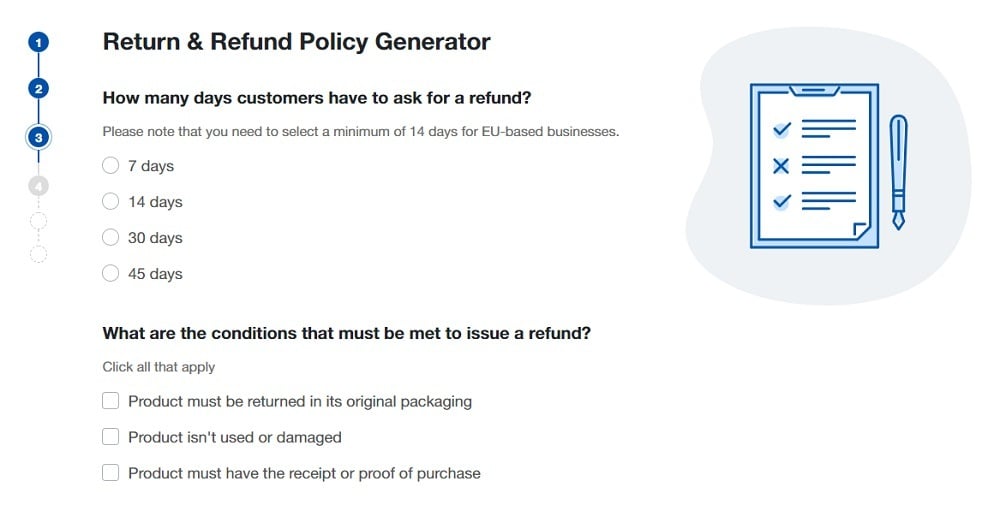
-
Enter an email address where you'd like to receive your Return and Refund Policy and click "Generate."
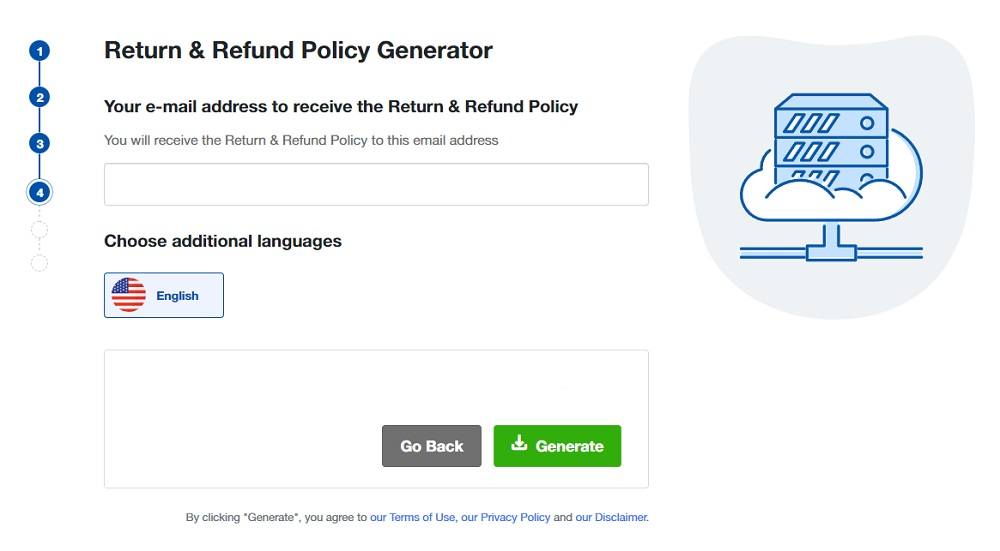
Done! You'll be able to instantly access and download your new Return and Refund Policy.
- 1. What are Some EU Return and Refund Laws?
- 2. What are Seller Obligations Under EU Return and Refund Laws?
- 3. Do I Need to Comply with EU Return and Refund Laws if My Business is Outside of the EU?
- 4. What are the Exceptions to EU Return and Refund Laws?
- 4.1. Do EU Return and Refund Laws Apply to Private Sellers?
- 4.2. Do EU Return and Refund Laws Apply to In-Store Purchases?
- 5. How Do I Comply with EU Return and Refund Laws?
- 6. Indicate Seller Status as Private or Professional
- 7. Have a Return and Refund Policy
- 7.1. Right of Withdrawal
- 7.2. Exceptions to Cooling Off Period
- 7.3. Shipping Costs
- 7.4. Conformity Guarantee
- 7.5. Returns Process
- 7.6. Return and Refund Timeline
- 7.7. Confirmation of Statutory Rights
- 8. How Do I Display My Return and Refund Policy?
- 9. What are the Penalties for Non-Compliance with EU Return and Refund Laws?
- 10. Summary
What are Some EU Return and Refund Laws?
There are various consumer rights protections in the EU. However, the two major return and refund laws are:
- EU Consumer Rights Directive: Gives consumers various rights, including the right to withdraw from a sales contract without explanation within 14 days (a "cooling off period") and the right to seek a repair, replacement, or full or partial refund for a product which is defective, faulty, or not as described within two years of purchase. These rules also extend to digital products and online services offered on a continual basis e.g. cloud services.
- EU Enforcement and Modernization Directive ("Omnibus Directive"): Expands the rights granted by the Consumer Rights Directive to include digital content and social media apps, downloaded for free, if the consumer provided personal data in order to download the content. In these circumstances, the user now has 14 days to cancel the contract. Traders must also specify if they're acting as a private or professional seller - more on this below.
What are Seller Obligations Under EU Return and Refund Laws?
We'll cover how to comply with the above rules below, but the key obligations imposed on sellers are:
- If a customer changes their mind: Consumers have 14 days to return a product without justification. After this point, you're not obliged to offer a refund unless it's a faulty or damaged product.
- If the product is damaged, faulty, or not as described: Consumers have at least two years to seek a full or partial refund, or get a replacement or product repair.
- If a customer wants to terminate a digital service contract for which they supplied personal data: They can end the contract, even for minor defects, and you must stop using their data.
- If digital service products are faulty: Within two years, you're obliged to offer a solution.
Do I Need to Comply with EU Return and Refund Laws if My Business is Outside of the EU?
Yes. If you sell goods or services within the EU, you must comply with EU return and refund laws. It doesn't matter where your business is physically located.
This is similar to how you're expected to comply with EU privacy and data protection laws if you have EU customers.
Will you always be expected to offer returns or refunds? No. Some exceptions do apply. Although you will often be expected to offer returns, refunds, or repairs, these remedies are not always legally required.
We will cover exceptions below, but for now, just bear in mind that these EU consumer protection laws apply to all businesses with EU customers, and more often than not, you'll be expected to offer returns, refunds, or repairs.
What are the Exceptions to EU Return and Refund Laws?
As mentioned above, sellers are not always expected to offer returns, repairs, or refunds under EU law. You are not required to honor the cooling-off period, or requests for a return or refund, for:
- Personalized items e.g. birthday gift with a certain name on it, a dress tailored to the customer's specific measurements
- Unsealed software, DVDs, or technology (if the customer unsealed it)
- Online streaming programs which the customer has downloaded and started watching
- Tickets, such as airplane or concert tickets, and hotel bookings and car rentals for specific dates
- Emergency or urgent repairs once price has been agreed
You can choose to offer more generous refund conditions. For example, some sellers will choose to offer refunds for more products, either as part of their Terms and Conditions agreement, or as a "one-off" goodwill gesture. However, your return and refund rules can never be more restrictive than EU rules.
Although the EU laws do not require sellers to always offer returns or refunds, laws may vary by Member State. Always get legal advice if you're unsure whether you need to offer refunds or returns in a particular territory.
Do EU Return and Refund Laws Apply to Private Sellers?
Another notable exception is the "private seller" exception.
EU return and refund laws only apply to traders. Traders are, according to the Consumer Rights Directive, anyone acting in the capacity of a profession, craft, trade, or business:

Private sellers, on the other hand, are individuals who are not acting in this capacity. For example, if a private individual sells their old car to another individual, even if the transaction is arranged online, this is a private rather than trade sale.
If you have an online store, or you frequently sell goods or services online, you are not a private seller and so the EU return and refund laws most likely apply to you.
Do EU Return and Refund Laws Apply to In-Store Purchases?
If a customer buys an item in a physical store, they can return the product, or ask for an exchange, within the 14-day cooling off period if:
- The product is faulty or damaged, or
- The product does not work as described
There's no automatic right, under EU laws, to return an item bought in store just because the customer changes their mind. This is different from items bought online or through distance selling e.g. a catalog.
Customers who buy items online or through distance selling have no opportunity to inspect the product before they buy, so they can return within 14 days for any reason without providing justification.
How Do I Comply with EU Return and Refund Laws?
From an EU perspective, there are three things that every seller must do to remain legally compliant:
- Indicate whether they are a private or professional (trade) seller
- Have a legally compliant Return and Refund Policy
- Display the Return and Refund Policy somewhere obvious
Let's look more in detail at each of these.
Indicate Seller Status as Private or Professional
The EU demands transparency from anyone selling to EU residents. Part of this commitment to transparency is indicating whether you're a private or professional seller acting in the course of your normal business.
Unsurprisingly, this obligation only applies if you're selling through an online marketplace or other less formal means of doing business. If you are a vendor selling through your own website or online store, the presumption is obvious enough that you are acting in the course of business as a trader.
How do you indicate seller status? You do not need a large advertisement. All you need is a clear indication of whether you're a private or professional seller.
DhewaDecor, for example, is a registered "professional" seller on Etsy, for EU purposes:
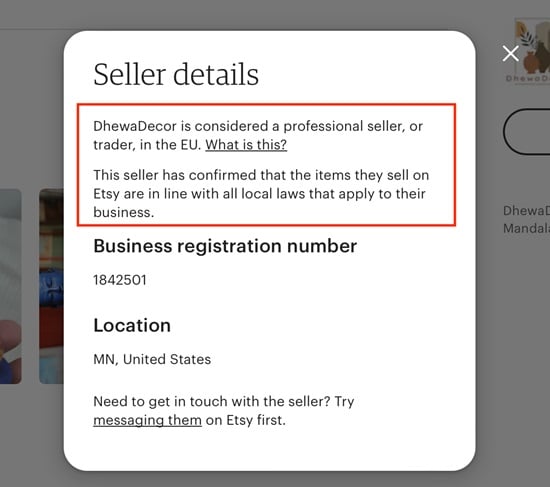
Whereas any of the people selling cars on an online marketplace, Gumtree, are considered to be private sellers, and so EU return and refund rules don't apply to any transactions there.
Here's a screenshot of a listing from the site that notes the seller is private:
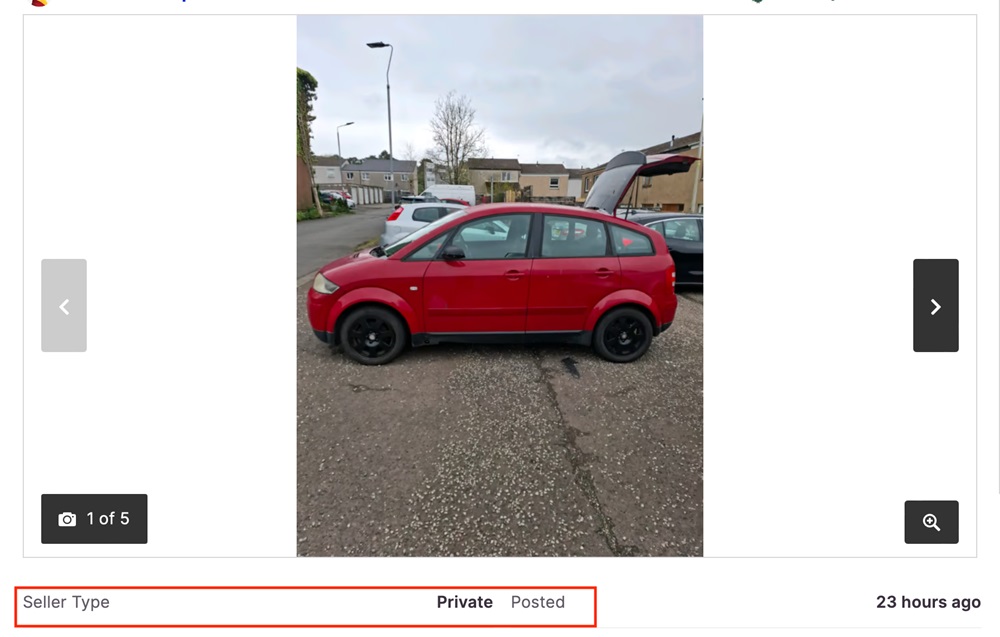
Although EU return and refund rules don't apply, private sellers on the platform must still comply with the platform's seller policies, consumer guarantees, and applicable Member State return and refund laws.
Have a Return and Refund Policy
There's no legal obligation to actually provide a Return and Refund Policy on your website. However, you are required to inform customers of their consumer rights, and a Return and Refund Policy is the best way to do this.
You can include it as part of your Terms and Conditions, or have a standalone policy.
Every Return and Refund Policy is slightly different depending on what you're selling. Some policies will be far more comprehensive than others. However, from the perspective of EU law compliance, the key clauses you should include are:
- Right of withdrawal ("cooling off period")
- Exceptions or final sale items
- Shipping costs
- Conformity guarantee
- How to initiate a return or exchange
- Timeline for processing a return or exchange
- Confirmation of statutory rights
Let's briefly consider what these clauses might look like.
Right of Withdrawal
Consumers have the right to be informed of their choices when it comes to canceling the sales contract. You must highlight a customer's right to withdraw, and give them at least 14 days to do so (if not more).
Hotel Chocolat has a very comprehensive clause on this within its Terms and Conditions. First, it states the customer's right of withdrawal and where it stems from. Then, it confirms specifically how long a customer has to return an item, and how they can do so:

Exceptions to Cooling Off Period
If you do not wish to accept returns or offer refunds on certain items (in line with EU law) then you must specify this in your Return and Refund Policy.
You should also draw attention to any exceptions prior to checkout and ideally on the product listing page. That way, before the customer even adds the item to their cart, they know they can't send the item back.
Here's an example from Not On the High Street. It's a personalized silver bracelet and, due to the unique nature of a personalized item, the retailer won't accept a return:
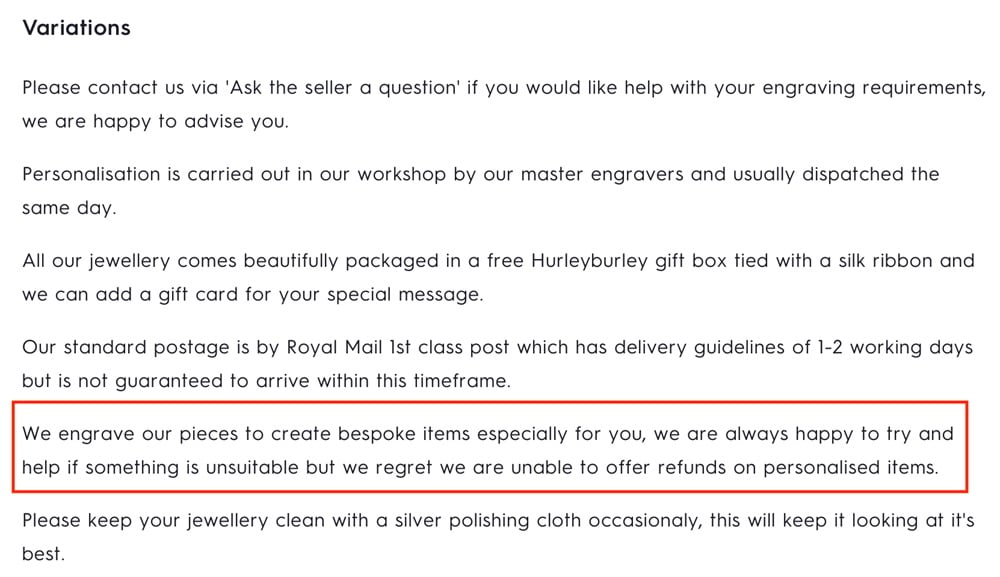
This is also stated quite clearly in the retailer's Return and Refund Policy. Helpfully, the reasons why the return can't be accepted has been specified in bold:
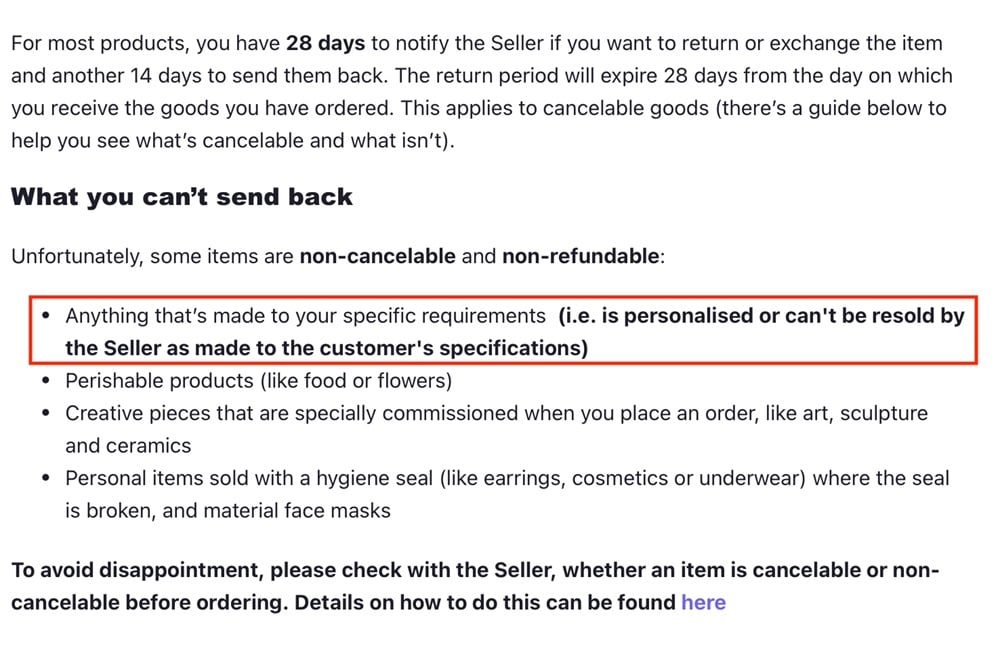
Shipping Costs
Be clear about who is responsible for covering any shipping costs, including return shipping and whether any original shipping charges will be refunded. Otherwise, there's a risk of consumers disputing charges they were not expecting (which goes against the transparency principle).
Here's an example from Cotswold. It's clear what postage costs are covered, and which are not:

Skechers agrees to cover all return costs for goods returned in accordance with its Returns Policy:

And Collectif London will cover postage costs for faulty goods, but not unwanted goods:

Conformity Guarantee
Confirm that you honor the legal minimum guarantee for faulty goods (two years), or that you have your own, more generous warranty provisions.
Here's an excellent example from Apple describing UK consumer laws, which are fairly generous. The use of small sections and easily readable paragraphs help consumers understand which laws apply, and when:
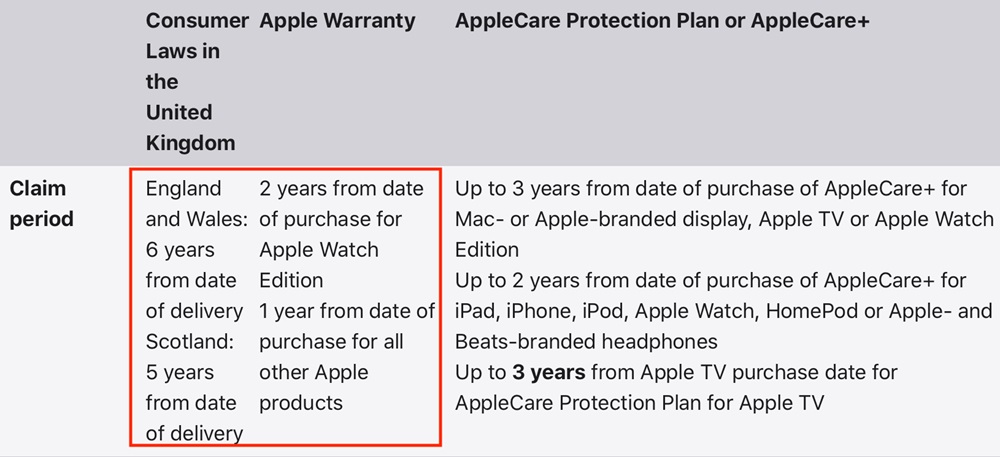
Returns Process
You're expected to make it simple for customers to exercise their right of withdrawal, so be clear about how your returns process works. The goal should be to keep this clause simple so that customers can quickly start the returns process.
Here's a good example of a succinct clause from Vendula London:

Return and Refund Timeline
Part of being clear on your returns process is setting a timeline for processing returns. This is about striking a balance between managing consumer expectations, processing returns efficiently, and ensuring that you can meet the timeline proposed.
For example, it takes Collectif up to 21 days to process a refund from when it receives the parcel. This gives the customer a clear timeline, but also gives the business a reasonable length of time to process the return, meaning it's less likely to breach obligations to the buyer:

And FITJEANS take up to seven days to process a refund from when the parcel arrives in its warehouse:
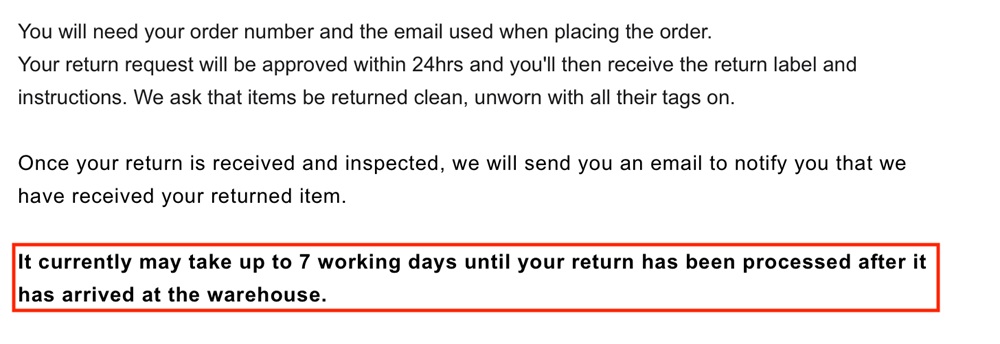
Confirmation of Statutory Rights
It's always worth emphasizing that customers have basic statutory rights that you will not infringe. Otherwise, you may be accused of misleading customers.
Here's a simple clause from Cotswold:

This short statement is all you need.
How Do I Display My Return and Refund Policy?
There are a few places where you can display your Return and Refund Policy for maximum visibility and legal compliance:
- Website header or footer
- Returns portal (if you have one)
- At checkout
- Within your Terms and Conditions agreement
Not On the High Street, for example, places its Return and Refund Policy link alongside its other key policies in the website footer:
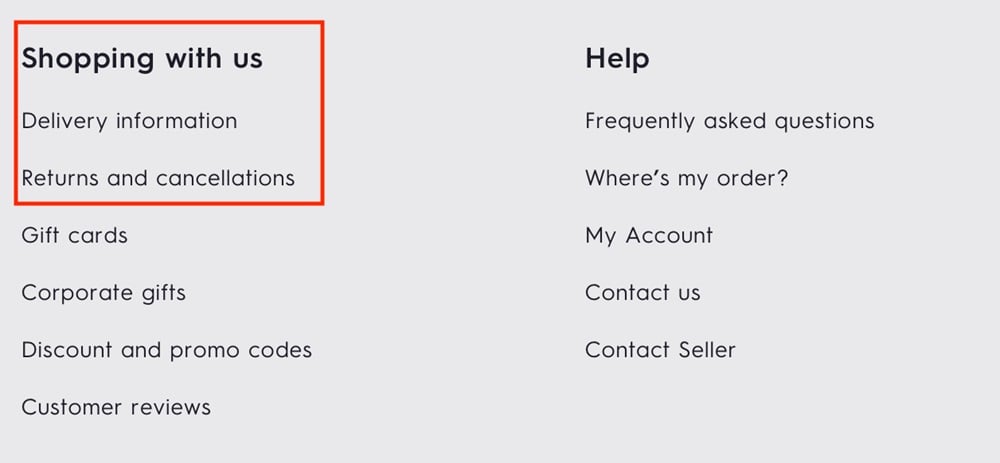
MyProtein has a dedicated Returns portal, through which you can view its Returns Policy before you get started:
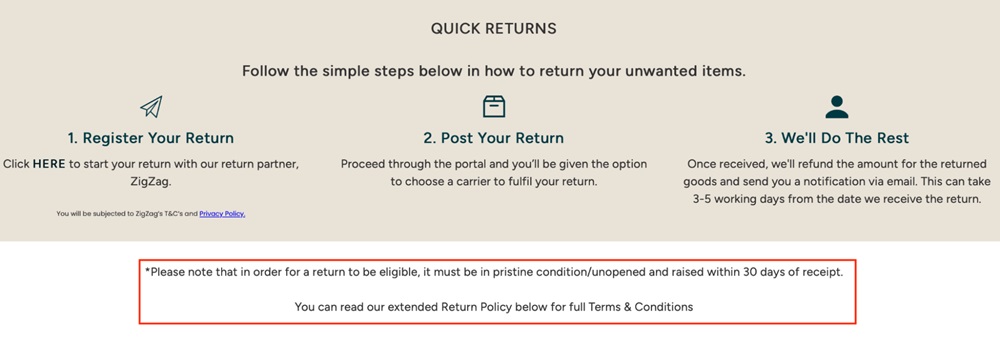
And, before you submit a MyProtein order, at checkout, you can review the Terms and Conditions, which include the key return and refund provisions:

For example, here is the right to cancel within 14 days:

Do you need express agreement to a Return and Refund Policy? Not necessarily. However, you must place it somewhere obvious, particularly during the checkout process, so that customers are aware of it before they complete their purchase.
And if you have any restrictions, such as "all sales are final" for personalized products, you must draw attention to such caveats.
What are the Penalties for Non-Compliance with EU Return and Refund Laws?
Any business or trader failing to comply with EU return and refund laws faces potentially large financial penalties. This could be, for example, a percentage of their annual turnover, or an equivalent fee. They'll also face reputation damage which will indirectly damage cashflow.
The exact penalties vary depending on the Member State. Seek legal advice if you're unsure whether you are compliant.
Summary
If you sell anywhere within the EU, it doesn't matter where your business is based. If you're a trader, or selling in the course of business, you must honor EU return and refund laws.
The two most important laws are the Consumer Rights Directive and the Omnibus Directive. Member States may have their own laws, but they can't be more restrictive than EU law.
The key requirements are as follows:
- Honor requests for refunds, repairs, replacements, or exchanges initiated within 14 days of delivery
- Provide a two-year guarantee on goods and services (including digital products)
- If selling on an online marketplace, make it clear if you're acting in the capacity of a trader or private individual
- Draft and publish an EU-compliant Return and Refund Policy. Specify, clearly, and restrictions or non-returnable items.
- Display your Return and Refund Policy prominently and at key points on your website e.g. at checkout and in your website footer with other important links

Comprehensive compliance starts with a Privacy Policy.
Comply with the law with our agreements, policies, and consent banners. Everything is included.
